World premiere play spotlights US Assyrian diaspora community
Martin Yousif Zebari unveils his first play, a look at family dynamics in the aftermath of the 2003 US invasion of Iraq.
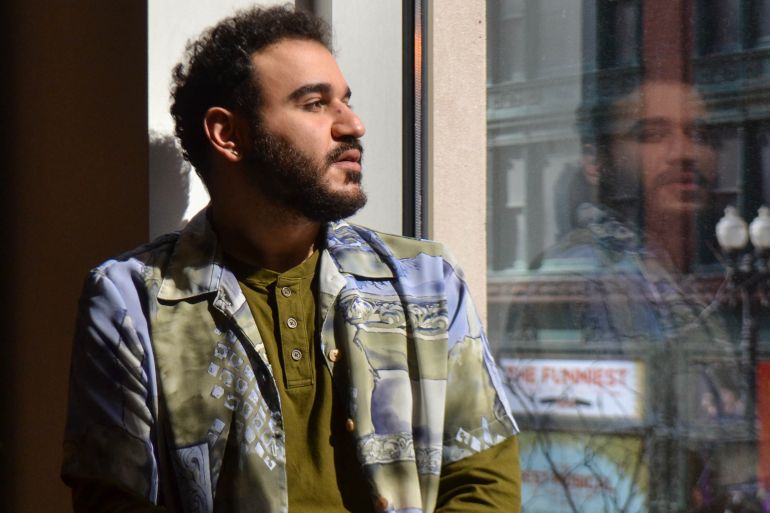
Chicago, Illinois – Something was different about the Goodman Theatre last week.
Maybe it was the drink menu, which boasted cocktails made of arak, a traditional West Asian liquor. Or maybe it was the set rising from the stage, depicting a well-to-do Baghdad home, centred around an intricate red-and-gold sofa.
Keep reading
list of 3 itemsIraqis still haunted by Saddam-era disappearances after his fall
Mutanabbi Street: An intellectual haven overcomes Iraq’s pain
But there seemed to be an extra pulse of excitement as the house lights dimmed and the actors stepped on stage for the world premiere of the play Layalina.
A story of migration, family and sacrifice, Layalina begins in 2003, with the United States invasion of Iraq. But its playwright, Martin Yousif Zebari, was determined not to compose a dour historical chronicle. Instead, he aimed to capture the joys, tensions and triumphs he himself had experienced as an Iraqi-born Assyrian American.
“I don’t see my life played out in tragedy,” Zebari, 29, said in an interview with Al Jazeera.
His play makes history for the Goodman, one of the most prominent regional theatre companies in the United States. Never before has the Tony Award-winning theatre hosted the premiere of a work of SWANA origin — an acronym that stands for South West Asian and North African.
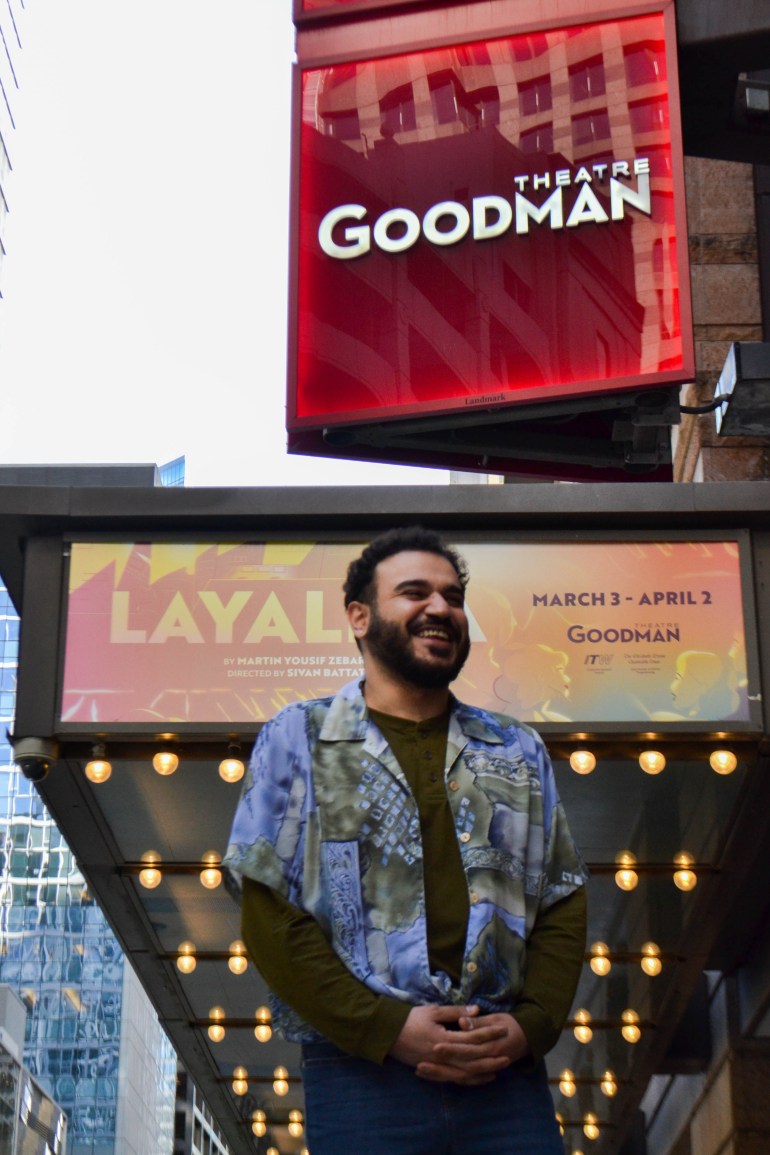
A story told across the generations
Like his characters, Zebari was raised in Baghdad, in the historically Assyrian neighbourhood of Dora. But his family left Iraq in 1999, moving first to Damascus, Syria, where they lived for three years.
Then, in 2002, they resettled in Skokie, Illinois, a suburban town north of Chicago.
At home in lockdown during the COVID-19 pandemic, Zebari began writing the story that would become Layalina. Its title means “our nights” in Arabic.
He drew on a combination of personal experiences and fictional elements for the play’s story, which — like his own — begins in Baghdad and ends up in Skokie.
The play opens in the home of the Ibrahim family, where father Yasir had hoped to protect and provide for his four children through the benefits of his elite government job.
But outside, the world is rapidly changing. The government has collapsed, US troops are patrolling the streets and former Iraqi President Saddam Hussein is in hiding. Protests are under way, and the eldest children in the Ibrahim household are eager to join in, despite their parents’ concerns.
It is a story that hinges on a clash of generations: between young and old, fear and optimism, tradition and change. But by the second act, the perspective shifts. Seventeen years have passed and the older siblings are now adults themselves, in charge of raising their younger brother and sister.
They live together in Skokie, where protests are once again unfolding, this time in the name of racial justice. It is 2020, and a Black man named George Floyd has just been killed by police.
“The point of the play is that this is a family seeking each other out and finding their way back to each other,” said director Sivan Battat, who herself has Iraqi heritage. “That’s really a powerful story to tell about a broad political moment in history.”
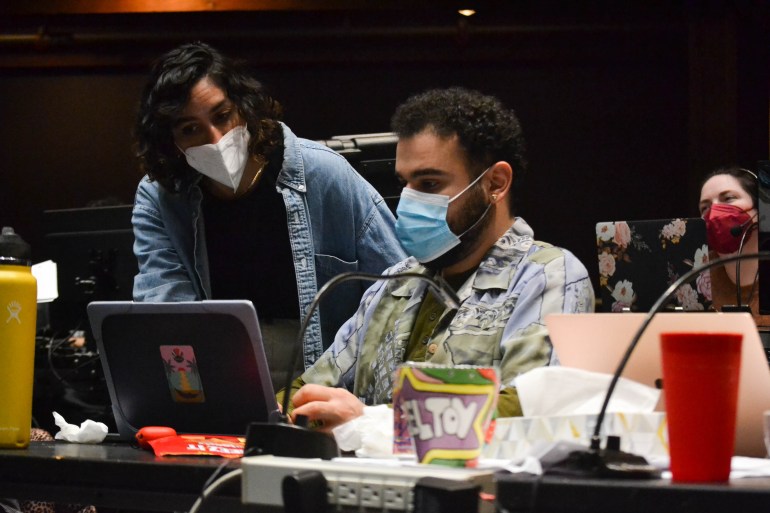
A mirror for history
Layalina’s opening performance on March 13 took place almost exactly two decades after the US invaded Iraq. The play itself begins on that same date in 2003, as tensions escalate in the days leading to the war.
“There’s something quite haunting about that,” Battat said of the parallels. “It’s kind of magnificent and powerful.”
She feels the play honours that historical moment “by telling a story that isn’t about war” but rather about something more intimate, more personal.
“It’s about family,” she explained, adding that the play also addresses how the Iraqi community, both at home and abroad, has had to wrestle with finding a sense of belonging.
Relationships, rather than politics, are at the heart of Layalina. And that is intentional, according to its writer.
“I am actively trying to fight against the political getting in the way of the personal,” Zebari said.
In the play, Zebari left Yasir’s job in the Hussein administration purposefully vague. Yasir’s government position merely indicates social status — something that can determine the outcome of immigration stories, Zebari explained.
Still, Zebari sought to capture the frustration and fear that led millions of Iraqis to flee the country in the 2000s. “The sh** we deal with in Baghdad, it doesn’t exist in America,” one character says in the course of the play.
A diaspora community in Illinois
The US invasion of Iraq proved to be a turning point in the history of Assyrians like Zebari. An ethnic group indigenous to the region, the Assyrian population in Iraq totalled nearly 1.5 million prior to the invasion.
Today, only an estimated 150,000 remain. Many fled violence, as the largely Christian population faced threats from armed groups after the start of the war.
New hubs for Assyrians formed in places like the Chicago metropolitan area. There, the population is estimated to be 100,000 strong — one of the largest Assyrian diaspora groups in the world.
Nevertheless, Zebari faced cultural rifts growing up in Skokie. Like the youngest characters in his play, he spent much of his childhood in the US, in contrast to his older siblings.
Zebari explained that he wrote Layalina as a way of understanding the “fundamental differences” in their upbringings.
“My childhood was disrupted and basically started over when I moved to the US,” Zebari said. “I didn’t understand why [my siblings] made the decisions that they made, why they behaved the way they did, why they felt and thought the way they did.”
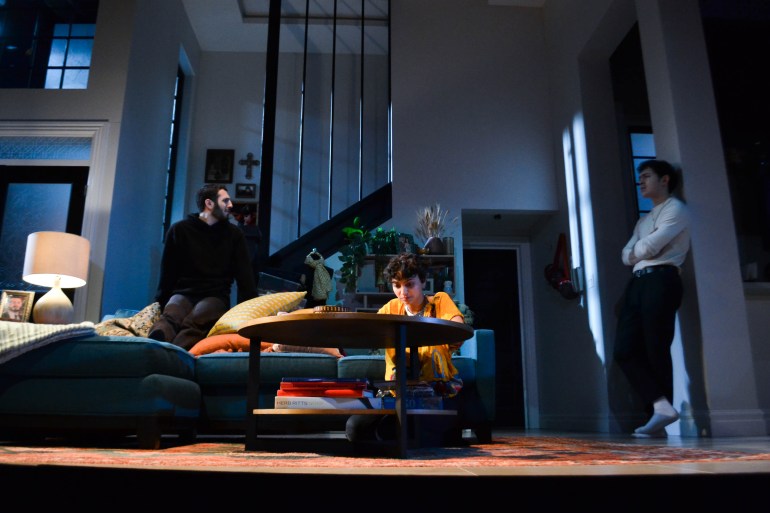
Zebari also imbued his characters with his experiences as a queer person, struggling to find acceptance and understanding in the community.
Caroline Benjamin, an Iraqi Assyrian who began working at Skokie’s Niles North High School while Zebari was a student there, remembers the playwright never seemed to compromise “his full authentic self”, despite the pressures he might have felt.
“He’s a proud queer Middle-Eastern man. Often, we don’t hear that perspective in the community,” said Benjamin, the activities director at Niles North.
Zebari credits theatre with serving as a haven to him as a youth, even as early as his junior high days.
“I quickly found theatre and found it to be pivotal for my growth and for learning English and making friends,” he said. “Being the new foreign kid was a lot easier to stomach in the theatre because it was an open, inviting place where I didn’t feel tokenised.”
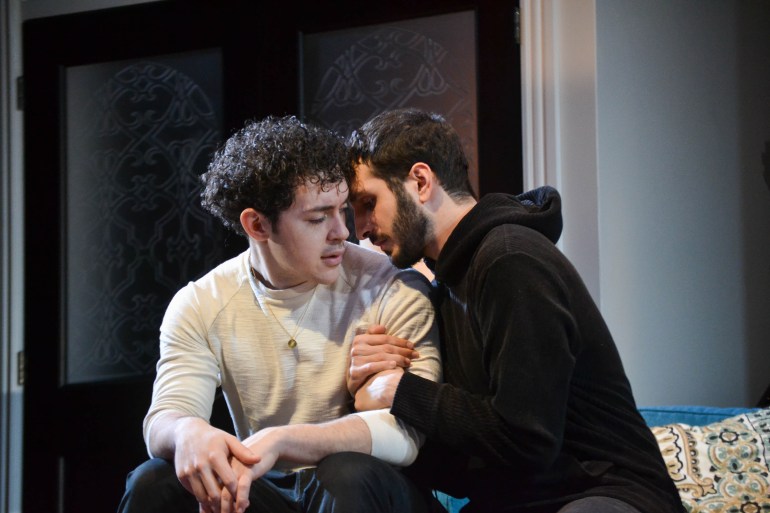
Unveiling the play
Well aware of the traditional conservatism in many Middle Eastern households, Zebari harboured anxieties about dramatising the intimate struggles of an Assyrian American family.
“It’s kind of a double-edged sword. For those who are not in my community, I’m like, ‘Will they understand it? Will they like it?’” Zebari said.
“And for those in my community: Will they stand to be challenged? Will they accept that I am visualising our people in our community in this very queer way that is completely unaligned with the majority of our representation and our realities?”
But for teenagers like Crystal Patto, plays like Layalina are important tools to bring visibility to queer-identifying Assyrians.
“A lot of people think it’s wrong to be you and love who you want,” said Patto, who attends the same high school Zebari once did. “In a Middle-Eastern home, it’s a lot about religion. You feel like you’re in the wrong for who you like just because of what your parents or church or friends might think.”
So far, Zebari said he has been “in awe of the positivity” he has received for Layalina. He dreams of writing more plays — and maybe even TV shows.
“I have incentive to keep working on it. To see that pride [Assyrians] feel when they see that there’s an Assyrian play at the Goodman,” he said, “that’s something very special.”